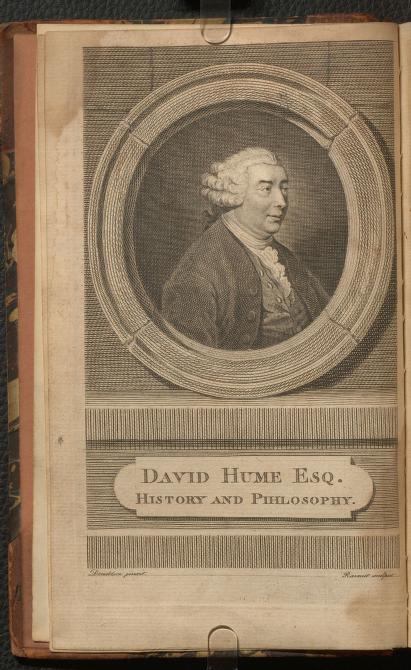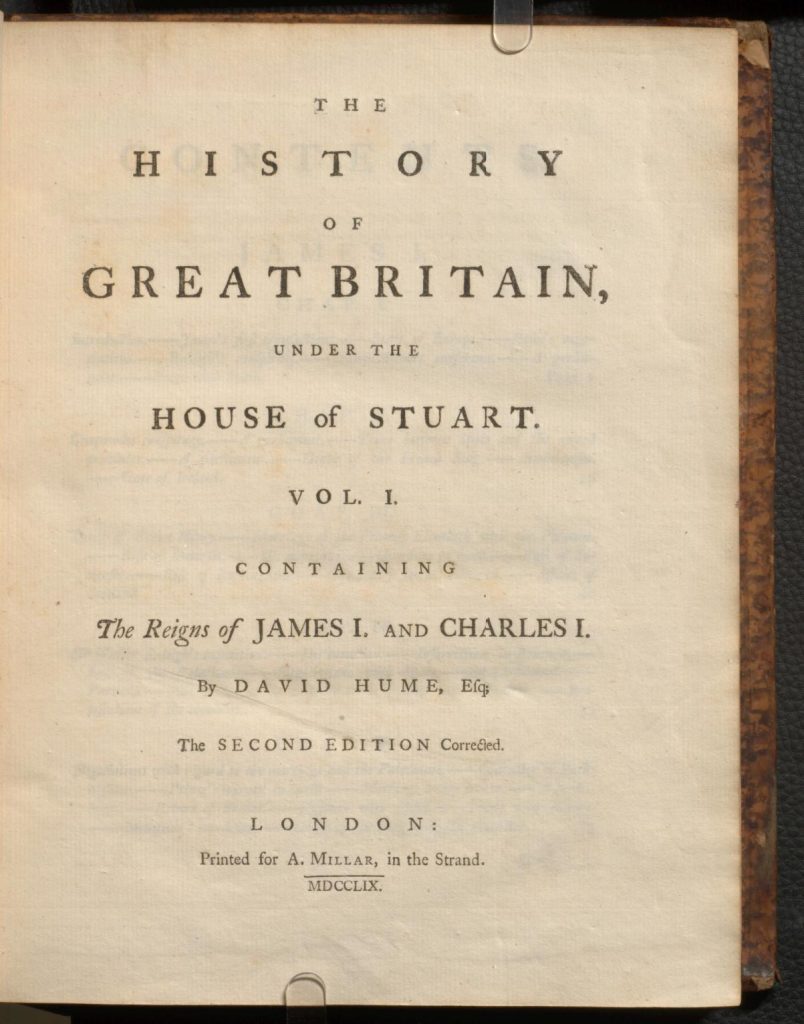By Mark G. Spencer, Department of History, Brock University.
McGill University’s David Hume Collection has many remarkable strengths. Any scholar with an interest in Hume and his world is sure to find much that will be of interest. The principal reason for my visit to the collection in March 2022 was to access the Library’s extensive holdings of early editions of Hume’s histories that would become his History of England (1778).


McGill’s world-class collection of Hume’s histories includes multiple copies of the earliest-published volumes comprising Hume’s The History of Great Britain. Published in Edinburgh in 1754 (by Gavin Hamilton, John Balfour, and Patrick Neill) and in London in 1757 (by Andrew Millar), those volumes were ones in which Hume wrote of the first Stuart kings (James I and Charles I), the Commonwealth, and the later Stuarts (Charles II and James II). The collection also boasts multiple copies of Hume’s two-volume The History of England, under the House of Tudor of 1759 and first editions of Hume’s histories of England’s earliest times, with an imprint of 1762 but published, it seems, in late 1761. As well, there are complete sets, in six and eight volumes and in different sized formats, of Hume’s complete History of England as published in London with imprints dated 1762, 1773, and 1778. The latter, while published posthumously, was the edition containing Hume’s last known authorial revisions.
With generous assistance from the librarians and staff in McLennan Library’s Rare Books and Special Collections and also from Greg Houston and McGill’s Digitization services, machine-readable scans of all of those volumes of Hume’s histories are now being produced. Those digital texts will feed into a collaborative project (conducted with scholars in Canada, Finland, and Scotland) that aims to produce a critical, annotated edition of Hume’s History for The Clarendon Edition of the Works of David Hume. That edition will establish Hume’s text, chart his revisions, identify his sources, and provide the first complete bibliography for Hume’s History of England.
But, McGill’s David Hume Collection is also exceptionally strong in several other fields that inform our understanding of Hume as historian. While working in the Reading Room, for instance, I was able to consult copies of books that Hume himself is thought to have owned. Many of those, such as the Abbé de Mably’s Observations sur l’histoire de France (1765), are listed in David and Mary Norton’s The David Hume Library. Others, like a copy of Robert Wallace’s A Dissertation on the Numbers of Mankind (1753) with Hume’s bookplate—it came from Raymond Klibansky’s library—are not. All of those volumes speak to Hume’s developing historical interests. So do others. Additional volumes in McGill’s collection, for instance, proved useful for my study of Hume as reviewer of the Rev. Robert Henry’s History of Great Britain. One was Cristoph Hermann von Manstein’s Memoirs of Russia (1770)—a volume with which Hume was involved, even writing an “Advertisement” published in the frontmatter of the London-published book.
Yet another strength of McGill’s collection is its wide-ranging holdings of contemporary responses to Hume’s histories. These range—to give representative examples—from William Tytler’s An historical and critical enquiry into the evidence . . . against Mary, Queen of Scots: with an examination of the Rev. Dr. Robertson’s dissertation, and Mr. Hume’s history, with respect to that evidence (1760), to New lights thrown upon the history of Mary Queen of England . . . Addressed to David Hume, Esq; author of The history of the Plantagenets, the Tudors, and the Stuarts (a 1771 translation of Henri Griffet’s work), to anonymously authored volumes like Critical Observations concerning the Scottish historians, Hume, Stuart, and Robertson (1782).
The collection is robust, too, on nineteenth-century reprintings of Hume’s works, including abridged, excised, or otherwise bowdlerized, editions. Here, we find books like The Student’s Hume,a popular, abridged version of Hume’s History which saw multiple nineteenth-century printings. Less well-known is the two-volume chapbook by Sarah Trimmer, A Description of a Set of Prints of English History (c. 1790s), which drew upon Hume for its simplified text produced for juvenile readers. The copy in McGill’s collection is inscribed “Susan Powell Warren / July 1st, 1813,” and then, “To her affectionate / son / John Warren / Boston / 1819.” At about the same time that the Warren family in Massachusetts was reading Hume’s English history for beginners, Thomas Ewell, a Virginian, produced America’s first edition of Hume’s essays—many, of course, with historical bent.McGill’s copy of Ewell’s rare Philosophical Essays on Morals, Literature, and Politics (1817)was printed in Philadelphia (other copies were printed in Georgetown, DC) and its untrimmed pages are still housed in their original blue boards.
As is almost always the case when one has the opportunity to spend time working in rich and deep collections such as McGill’s, unexpected treasures turn up. For me, these included various copies of early printings of Hume’s My Own Life, some with manuscript marginalia and contemporary newspaper pastings. Another was a brilliant copy of Hume’s A True Account of the Behaviour and Conduct of Sir Archibald Stewart, Esq; late lord provost of Edinburgh: in A letter to a friend (1747). Only a handful of copies of Hume’s pamphlet defending his friend are known to exist. In this case, the pamphlet is presented to us single-stitched into its simple, blue wrapper. Consulting other rare, printed sources in the Reading Room, I was able to begin to unpack some of what promises to be a hitherto-unexplored aspect of Hume’s True Account. Pursing that story will serve to remind us that Hume’s historical thinking found its way into texts besides his monumental History of England.
McGill’s David Hume Collection is made possible by the generous support of its donors and the work of the professional and friendly librarians and staff who maintain and provide access to the collection today. My sincere thanks to them all. – Mark G. Spencer

Mark G. Spencer is Professor of History at Brock University. Among his books on Humean topics are David Hume and Eighteenth-Century America (2005), David Hume: Historical Thinker, Historical Writer (2013), and Hume’s Reception in Early America: Expanded Edition (2017). He was also editor-in-chief of The Bloomsbury Encyclopedia of the American Enlightenment (2015)and author, most recently, of John Beale Bordley’s “Necessaries”: An American Enlightenment Pamphlet in its Historical Contexts (2020). While working in Rare Books and Special Collections, he pursued research related to Hume as historian. Foremost of these projects is the multi-volume edition of Hume’s History of England that he and colleagues have contracted with Oxford University Press to prepare for The Clarendon Edition of the Works of David Hume. Spencer was the 2022 recipient of the McGill Library Hume Society Research Travel Grant.














Leave a Reply
You must be logged in to post a comment.